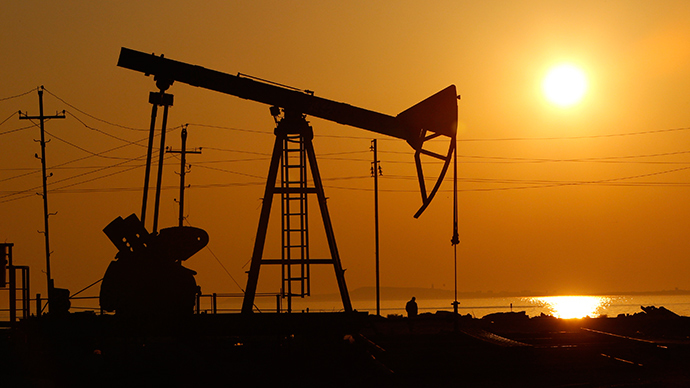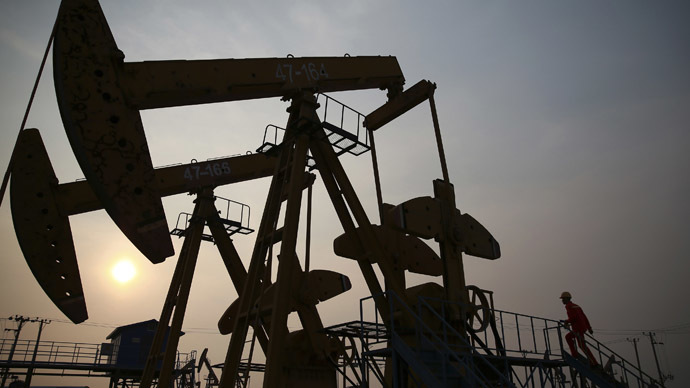Cheap oil, falling ruble, but ‘things not as bleak as they might seem’

As a lot of exported Russian oil and gas is paid for in foreign currency and the government debt is comparatively low, things in Russia are not that bleak despite the falling ruble and oil price, Patrick Young, global markets expert, told RT.
RT:Patrick, What is happening to the Russian ruble?
Patrick Young: Well, quite often when you see such a huge dislocation actually you do get some sorts of a bind in a market place, and certainly today we saw at one stage the ruble was down more than 6 percent against the US dollar, it closed today in Moscow around 5 percent down, obviously it came a little bit off its lows, we think there was probably a little bit of gentle intervention from the Russian Central Bank, trying to make things look a little bit calmer. But nonetheless it’s a huge fall all of a sudden, coming on top of what has been a pretty horrid year for the ruble itself.
RT:We've heard how such a low currency value is affecting the market - but what about the people?
PY: It is very interesting, why has it happened [Monday], perhaps it’s because actually the USA has been on a holiday for the long weekend of Thanksgiving and therefore markets on [Monday] morning were probably a little bit more lazy and slow to move. I think a lot of people suddenly started to digest the news that came through from the OPEC meeting last week where as you remember OPEC decided they were going to keep pumping as much oil as they have done in the past, they are not going to restrict that supply. That started the oil market moving very early and we saw Brent crude, West Texas Intermediate - off several dollars again this morning. That was causing therefore a push through because people have started to get very worried about the whole situation, because obviously the Russian budget is tied in some way to effectively $100 barrel oil and we are looking at the moment at the price that’s well below $70.
RT:What about other oil producing countries, are they also in trouble?
PY: Absolutely, Venezuela is something like $150-160, Iran – $180, there are many other countries that are really in trouble, even actually at around about $65-70 a barrel many of the Gulf States themselves have got difficult issues with their budgets. And I’m not just talking about someone like Libya or the countries that have been in trouble, but even the UAE is really somewhere around this sort of ballpark figure. However, people have started really concentrating on the whole Russian story. What they are looking at there is obviously tied in with the sanctions issue, tied in with the whole Ukrainian problem. People are deeply concerned because they are looking at the idea that Russia does have debt that it needs to refinance in US dollars. But at the same time we have to be reasonable at this juncture. Things are not that bleak as they might seem. For one thing after all, a lot of Russian oil and gas that’s being exported is actually paid for in foreign currency. So therefore, effectively, Russia is making more money in rubles than it expected to get previously. At the same time obviously there are worries about the dollar situation at the moment - Russia has to refund things. But let’s think about this pragmatically: Russian government debt is actually very low. Compare it to someone like the eurozone; compare it to someone like Italy - 150 percent of GDP. Russian debt is actually a fraction of that at this juncture. Obviously this is not a reason to be in any way complacent.

RT:Is there anyone who actually benefits from such low oil prices?
PY: Obviously we are going to see lower prices at the pumps, people who use o lot of domestic gas will probably expect to see prices coming down. I’m in London today, obviously, the taxi drivers are rejoicing, they are telling me they are saving £7-10-20 a week compared to what they were paying just a few months ago. Therefore consumers will notice a certain impact across the world, provided you are in a country which of course has free market oil and gas in the first place. If you are heavily subsidized - someone like Venezuela - you are not noticing any differences in the first place. There are issues, it is going to benefit. Obviously, every product in the world has to be transported so therefore there will be some degree of deflation overall. The worry is of course that many governments have budgeted from much higher oil price and those who produce it are now $30-40-50 or even $100 off from what they expect to balance the books. That’s going to be a problem for the fundamental business of government.
RT: It's not just the Russian ruble which is plummeting - other currencies are suffering too. Could more countries follow suit? What about the situation in Italy?
PY: What we have at the moment in Italy is a catastrophic stagnation, the very moral fiber the economic backbone of the country is falling apart. Italy needs wholesale reform. It has massive debt – 150 percent debt to GDP ratio or something like that. The government has been borrowing for 50-60 years willy-nilly. The difficulty is actually in recent years the government has behaved quite sensibly, it is essentially trying to cover its debts. The problem is that this is very difficult to get back when they are dealing with a euro currency over which they have no control. Silvio Berlusconi, let’s face a shrewd businessman, a self-made billionaire, you don’t get many of those in politics these days, he is someone who understands the value of money and the value of the economy. What is he looking to try and get going is the idea of using a parallel lira being introduced and that possibly being a better way for Italians to sell their goods? Because at the moment Italian exporters, the backbone of the nation, whether they are selling tomatoes or selling olive oil or wonderful luxury handbags, they are suffering, because they are being priced in euro and that’s an artificially high currency. It means they are not competitive in the global market. Berlusconi wants to slip in alternative means to price their goods. That may mean cheaper Prada handbags; it also could mean a lot more exports of olive oil to the rest of the world at lower prices. That can only be good for a Mediterranean country where youth unemployment is 50+ percent - that is entirely untenable.
RT:What do you think about the future of the euro? Are there going be any alternatives?
PY: The situation at the moment in the eurozone is that ultimately nobody in the Commission wishes to address the fundamental competitiveness deficit in Europe. Therefore we are at situation where quite clearly these ideas are being floated. They may seem outlandish, but every day that you see millions of Italians unemployed, 50+ percent of the youth unable to find a job. We are in the situation where it’s more likely that sooner or later alternatives to the euro are going to evolve. Some people have already moved in the bitcoin, other people are looking at the idea of revitalizing local or national currencies. The Berlusconi plan, very interesting, because sooner or later it is going to happen unless the burgers of Brussels get their act together and find a way to cure the fundamental design flaws of the euro. Ultimately, it is very difficult to say how they are going to be able to achieve that, given the fact that they comprehensively failed over the course of the last six years of stagnancy and crisis. Italy sits on the brink, sooner or later, the new currency, a new money, or simply walking away from the euro is going be an increasingly attractive option. You can’t let your citizens starve.
The statements, views and opinions expressed in this column are solely those of the author and do not necessarily represent those of RT.
The statements, views and opinions expressed in this column are solely those of the author and do not necessarily represent those of RT.













